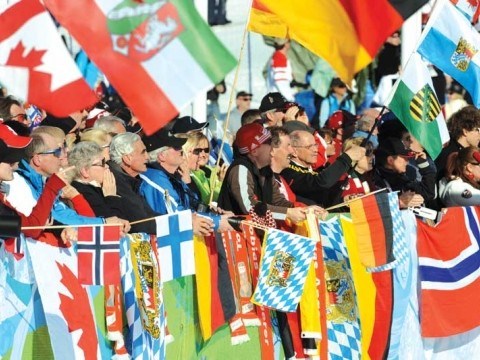If Whistler wasn't a household name before the 2010 Winter Olympics, it is now.
Tourism B.C. and Tourism Whistler collaborated on a series of surveys in the U.K., Australia and Germany to measure the level of awareness before the 2010 Olympic Games and afterwards, and the results are significant.
Using an international polling company, the tourism associations polled 1,000 people in each country in November 2009, January 2010 and again in March 2010. While the level of awareness was generally flat between November and January, the March 2010 survey showed that:
• Awareness in the U.K. increased from 32 per cent to 45 per cent
• Awareness in Germany increased from 19 per cent to 42 per cent
• Awareness in Australia increased from 48 per cent to 62 per cent
Louise Walker, manager of research at Tourism Whistler, said that another study will be conducted in November 2010 to see whether the level of awareness is maintained.
"We didn't see much difference between November (2009) and January, which you would expect, but obviously awareness went up in March following the Olympics," she said. "Now we're going to do it again in November and make sure that it's a long term awareness and not a short-term thing."
Each survey involved 1,000 respondents in each country and nobody was asked the same question twice.
There will be more data to come out of the survey, which Walker is currently putting together. In addition to asking general awareness questions about British Columbia and Whistler, the surveyors at Taylor Nelson Sofres Global Market Research also asked respondents whether they planned a leisure trip to the province in the next few years, as well as what's appealing about British Columbia as a tourist destination. Walker hopes to be able to release that data in the coming weeks.
Last week Tourism Whistler confirmed plans to capitalize on the limited window of global recognition in the wake of the Games, boosting its marketing spending by 20 per cent over the summer and through next winter. That represents half a million dollars in additional spending in key markets, both for tourism and conferences.
As well, Tourism B.C. - which is now a division of the provincial Ministry of Tourism, Culture and the Arts - and the Canadian Tourism Commission are launching their own campaigns to capitalize on the Olympic buzz.
Meanwhile, Tourism Whistler also released other Games data this week.
Among other things, Tourism Whistler confirmed that Whistler achieved an occupancy rate of 97 per cent during the 17 days of the 2010 Olympic Winter Games, or about seven per cent higher occupancy than expected. To put that into perspective, the projected 90 per cent occupancy rate was already higher than the levels achieved in Torino, Italy in 2006 and Salt Lake City in 2002.
Paralympic numbers are still being finalized, but occupancy in Whistler is expected to measure around 75 per cent for the 10 days of the Games. Fresh snow and the reopening of the day skier lots also had an impact.
As well:
• Ten walk-up kiosks located around Whistler, sponsored by Tourism Whistler and the Resort Municipality of Whistler, served over 100,000 visitors during the Olympics and Paralympics, or more than three times the 29,000 visitors served at kiosks in February and March of 2009.
• Whistler.com received 255,000 visits during February 2010, the busiest month yet for Tourism Whistler's online booking site. Visits were mainly in relation to updated information on sports, cultural and tourism opportunities during the Games.
• Whistler Media House, which was run by Tourism Whistler, supported roughly 1,100 unaccredited media in the resort for the Games representing an estimated 175 outlets ranging from print to television to Internet. The Whistler Media Centre hosted by the Vancouver Organizing Committee hosted over 3,000 international media.
• The Games broadcast support system provided 14 locations in Whistler for television broadcasters with fibre connections to allow live television and webcasting. More than 300 hours of live broadcasting was delivered through this system to over 40 countries.
• The amount of non-broadcast media increased almost ten-fold during the Games. Tourism Whistler tracks approximately 100,000 global news outlets in 110 countries and found 220,000 articles and stories in the first 12 weeks of 2010 compared to 25,000 articles and stories over the same period in 2009.
Tourism Whistler is now working to leverage Olympic legacies, including the Whistler Olympic Park, Whistler Sliding Centre, Whistler Medals Plaza, the athletes' village and Whistler High Performance Centre, Austria Passive House, the $600 million upgrade to the Sea to Sky Highway and the fibre network installed by Bell Canada throughout Whistler as part of their Games sponsorship package.




